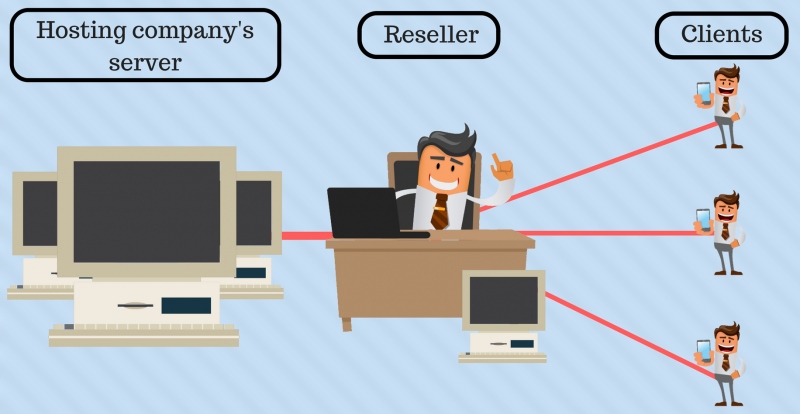Table of Contents
Key Highlights
In this article, you will learn that:
- A reseller program is a business model where a company allows individuals or businesses to resell their products or services under their own brand.
- Affiliates typically promote the company’s products or services through a unique affiliate link and earn a commission for each sale or lead that is generated through that link.
- The reseller typically purchases the products or services at a discounted price and then sells them to customers at a markup.
- An affiliate program is performance-based marketing where a business rewards its affiliates for each customer or leads they bring to the company.
- The use cases of a reseller program are to offer additional services, start a new business, or grow a side hustle.
What is a Reseller?

A reseller is a company or individual who purchases web hosting products or services with the intention of reselling them to potential customers to up-sell their services or start a web hosting business.
They act as a middleman between the provider of the products or services and the end customer. Resellers typically purchase these products or services at a discounted rate and then mark them up to make a profit.
This business model allows resellers to offer their customers a wider range of products or services without having to invest in the infrastructure or resources required to produce them. The hosting package provider will take care of the hardware, software and general infrastructure required to host the customers’ websites.
As a reseller, you can sign up for a reseller program and migrate your clients’ websites to earn more revenue and support them.
Pros and Cons of Reselling Program
Reselling is the act of buying products or services at a lower price and selling them at a higher price for a profit. It can be a great way to make money, but it also has some potential drawbacks.
Pros:
- Low startup costs: Reselling can be a relatively low-cost business to start. You don’t need to invest in inventory or manufacturing, and you can often start reselling with just a small amount of money.
- High profit margins: Reselling can be a very profitable business, especially if you are able to find products that are in high demand and sell them for a higher price.
- Flexibility: Reselling can be a very flexible business. You can work from home, set your own hours, and sell products or services that you are passionate about.
- No experience necessary: You don’t need any prior experience to start reselling. Anyone can do it, regardless of their age, education, or background.
Cons:
- Competition: The reselling market is very competitive, so you will need to find a way to differentiate yourself from other resellers.
- Risk: There is always some risk involved in reselling, as you may not be able to sell all of your products or services.
- Time commitment: Reselling can be a time-consuming business, especially if you are trying to scale your operations.
- Customer service: As a reseller, you will be responsible for providing customer service to your customers. This can be a challenge if you are not used to dealing with customer complaints.
What is an Affiliate?

An affiliate program is a way for individuals or businesses to earn commission by promoting a company’s products or services.
To get into an affiliate program, an individual or business must first identify a niche they are interested in and create content for it. The company will then provide a unique link for the affiliate to include on their website or in their content. When someone clicks on this link and makes a purchase, the affiliate earns a commission.
For example, Amazon offers an affiliate program that allows businesses and bloggers to earn commissions by promoting their products. As an affiliate, you would work as a sales representative for the company by including links on your website or in your content. Overall, affiliate programs are a great way for businesses and individuals to earn money by promoting products or services they believe in.
Pros and Cons of an Affiliate Program
An affiliate program is a marketing strategy in which a business rewards individuals or businesses (affiliates) for promoting its products or services. Affiliates typically earn a commission for each sale they generate.
Pros:
- Low cost: Affiliate programs are a relatively low-cost way to promote your products or services. You don’t have to pay affiliates anything upfront, and you only pay them when they generate a sale.
- Scalable: Affiliate programs can be easily scaled up or down as needed. If you’re just starting out, you can start with a small number of affiliates and then add more as your business grows.
- Targeted reach: Affiliates can help you reach a targeted audience. They can promote your products or services to their own followers, who are already interested in the things you offer.
- Increased sales: Affiliate programs can help you increase sales. When affiliates promote your products or services, they’re essentially giving you free advertising.
- Data insights: Affiliate programs can provide you with valuable data insights. You can track how many sales each affiliate generates, which products or services are most popular, and where your traffic is coming from. This information can help you improve your marketing campaigns and make more informed business decisions.
Cons:
- Competition: There is a lot of competition in the affiliate marketing space. This means that you need to make sure your program is competitive in terms of commissions and other incentives.
- Fraud: There is always the risk of fraud with affiliate programs. Some affiliates may try to generate fake clicks or sales in order to earn commissions. You need to have safeguards in place to protect yourself from this.
- Time commitment: Affiliate programs can be time-consuming to manage. You need to track your affiliates’ performance, pay them commissions, and resolve any disputes.
- Control: You have less control over your marketing message with affiliate programs. Your affiliates may promote your products or services in a way that you don’t approve of.
Reseller Program vs Affiliate Program: What is the difference

Reseller programs and affiliate programs are both marketing strategies that involve partnering with external individuals or businesses to promote and sell products or services, but they differ in their structures and purposes. Here are the key differences between a reseller program and an affiliate program:
- Product Ownership and Distribution:
- Reseller Program: In a reseller program, the reseller typically purchases the product or service from the original manufacturer or provider at a discounted price and then sells it to end customers at a markup. The reseller takes ownership of the product before selling it.
- Affiliate Program: In an affiliate program, affiliates promote the products or services of a company and earn a commission for each sale or lead generated through their referral. Affiliates don’t own the products or handle transactions; they simply refer customers to the merchant.
- Financial Model:
- Reseller Program: Resellers make a profit by selling the products or services at a price higher than their cost, keeping the difference as their profit.
- Affiliate Program: Affiliates earn a commission or a percentage of the sale for each customer they refer to the merchant. They don’t handle transactions or set product prices.
- Inventory and Fulfillment:
- Reseller Program: Resellers may need to manage inventory, handle shipping, and deal with customer support. They take on a more active role in the sales process.
- Affiliate Program: Affiliates are not responsible for inventory management, order fulfillment, or customer support. These aspects are typically handled by the merchant.
- Relationship with Customers:
- Reseller Program: Resellers have a direct relationship with their customers and are responsible for providing customer support, handling returns, and managing the overall customer experience.
- Affiliate Program: Affiliates don’t have a direct relationship with the customers. Once they refer a customer, the merchant takes over the customer relationship, including support and post-sale interactions.
- Risk and Investment:
- Reseller Program: Resellers may need to invest in inventory, storage, and other aspects of the sales process. They also bear the risk of unsold inventory.
- Affiliate Program: Affiliates typically have lower upfront costs and less risk, as they don’t invest in inventory or deal with order fulfillment.
Reseller use cases
Resellers play a crucial role in various industries, facilitating the distribution and sale of products and services. Here are some common use cases for resellers:
- Technology Products:
- Hardware and Software: Resellers often distribute and sell computer hardware, software licenses, and other technology products. They may specialize in specific brands or types of technology.
- Retail Industry:
- Consumer Electronics: Resellers can focus on selling consumer electronics such as smartphones, laptops, cameras, and other gadgets.
- Clothing and Apparel: Some resellers specialize in distributing and selling clothing and fashion items from different brands.
- Wholesale Distribution:
- Bulk Goods: Resellers can operate in the wholesale market, purchasing products in large quantities from manufacturers and selling them to retailers or other businesses.
- Automotive Parts:
- Spare Parts: Resellers in the automotive industry may specialize in distributing spare parts, accessories, or components to retailers or repair shops.
- Healthcare Products:
- Medical Equipment: Resellers may distribute medical equipment, devices, or supplies to hospitals, clinics, and other healthcare institutions.
- Industrial Supplies:
- Raw Materials: Resellers can specialize in distributing raw materials, components, or industrial supplies to manufacturers in various industries.
- Food and Beverage:
- Distributors: Resellers play a role in the food and beverage industry by distributing products from manufacturers to retailers, restaurants, and other establishments.
- Telecommunications:
- Communication Devices: Resellers may focus on distributing smartphones, tablets, or other communication devices from manufacturers to retailers or end consumers.
- Printing and Publishing:
- Printing Services: Resellers in this industry might offer printing services, including brochures, business cards, and promotional materials.
- Business Services:
- Consulting and Training: Resellers in the service industry may offer consulting or training services, acting as intermediaries between service providers and clients.
- Software and IT Services:
- Managed Services: Resellers can provide managed IT services, offering solutions such as cloud computing, cybersecurity, and software development.
- Electrical and Electronic Components:
- Electronic Components: Resellers may distribute electronic components such as semiconductors, resistors, and capacitors to manufacturers in the electronics industry.
- Entertainment and Media:
- Distribution of Content: Resellers may be involved in the distribution of digital content, such as music, movies, or video games.
- Educational Products:
- Textbooks and Learning Materials: Resellers can distribute educational products to schools, colleges, and other educational institutions.
Affiliate use cases
Affiliate marketing is a versatile strategy that can be applied across a wide range of industries. Here are some common use cases for affiliate marketing:
- E-Commerce:
- Product Sales: Many e-commerce businesses use affiliate marketing to increase sales by partnering with affiliates who promote their products. Affiliates earn a commission for every sale generated through their referral.
- Online Retail Platforms:
- Marketplace Referrals: Affiliate marketing can be applied on online marketplaces where affiliates earn commissions for driving traffic and sales to individual sellers within the platform.
- Travel and Hospitality:
- Hotel Bookings and Travel Packages: Travel agencies and hotel booking platforms often use affiliates to promote their services. Affiliates earn commissions for each booking made through their referral links.
- Financial Services:
- Credit Card and Banking Services: Financial institutions use affiliates to promote credit cards, banking services, or investment products. Affiliates earn commissions for successful customer referrals.
- Digital Products and Services:
- Software and Apps: Companies offering digital products, such as software or mobile apps, may utilize affiliates to drive downloads or subscriptions. Affiliates earn commissions for each user acquired through their promotions.
- Subscription Services:
- Streaming Platforms: Subscription-based services like streaming platforms often use affiliates to attract new subscribers. Affiliates earn commissions for every user who signs up through their referral link.
- Health and Wellness:
- Fitness Products and Supplements: Companies in the health and wellness industry use affiliates to promote products like fitness equipment, supplements, and health-related services. Affiliates earn commissions on sales generated through their referrals.
- Education and Online Courses:
- Online Learning Platforms: Educational institutions and online course providers use affiliates to promote their courses. Affiliates earn commissions for each student who enrolls through their referral.
- Web Hosting and Domain Services:
- Hosting and Domain Registrars: Companies providing web hosting and domain registration services often employ affiliates to drive new customers. Affiliates earn commissions for each customer who purchases hosting or registers a domain through their referral.
- Fashion and Beauty:
- Apparel and Beauty Products: Fashion and beauty brands use affiliates to promote their clothing, accessories, and beauty products. Affiliates earn commissions on sales generated through their promotional efforts.
- Home and Lifestyle Products:
- Furniture, Home Decor: Companies selling home and lifestyle products may collaborate with affiliates to increase sales. Affiliates earn commissions for each sale resulting from their referrals.
- Affiliate Networks:
- Aggregators and Networks: Affiliate networks connect merchants with affiliates across various industries. Affiliates can choose from a range of products and services to promote, and merchants benefit from a broader reach.
- Gaming Industry:
- Video Games and Gaming Accessories: Gaming companies use affiliates to promote video games, gaming accessories, and related products. Affiliates earn commissions for sales generated through their marketing efforts.
